Security cameras have become a staple of modern society, keeping us safe from potential dangers. But what happens when they can no longer provide that security? Can security cameras be jammed?
This is an important question to ask in order to understand the implications and if it’s even possible.
With the advancement of technology, there is always the risk of new methods being developed to find ways around the systems we rely on for safety.
In this blog post, I will dive into the question: Can security cameras be jammed? I’ll explore different types of security cameras and their vulnerability to jamming or hacking attempts so that you can make informed decisions about securing your property.
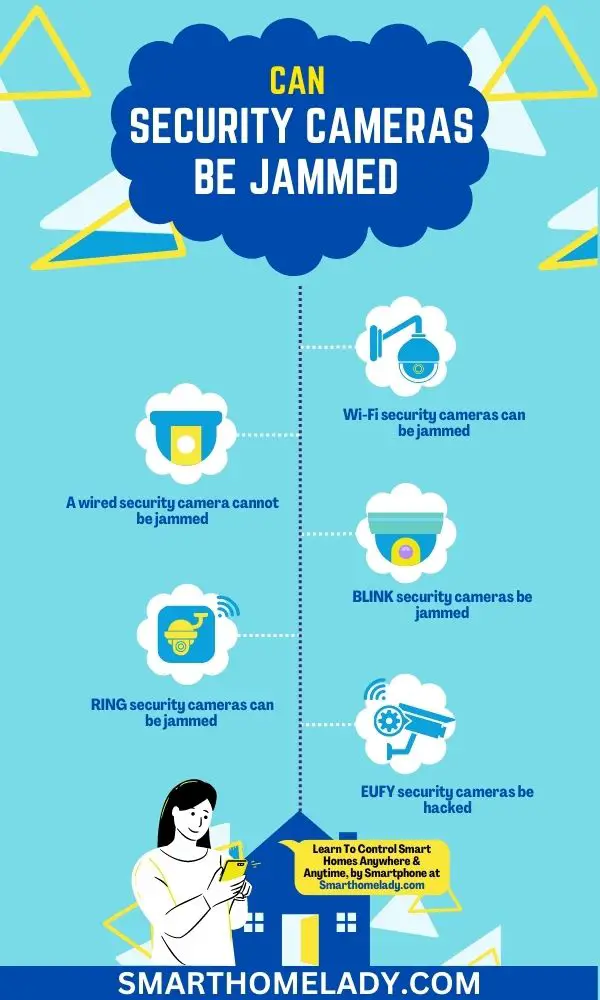
Contents
- 1 Can someone jam my security camera? Answer is Yes
- 2 Vulnerability of Different Security Cameras to Jamming
- 3 Can wired security cameras be jammed?
- 4 Can wiFi security cameras be jammed?
- 5 Can wireless security cameras be jammed?
- 6 Can home security cameras be jammed?
- 7 Can ring security cameras be jammed?
- 8 Can CCTV cameras be jammed?
- 9 Can eufy security cameras be hacked?
- 10 Can blink security cameras be hacked?
- 11 Can criminals jam wifi cameras?
- 12 How to Detect a camera jammer – 7 Ways
- 13 What To Do If You Suspect Your Security Cameras Are Jammed? 4 Steps
- 14 Security cameras that can’t be jammed – Cameras With These 3 Features
- 15 Can People Jam Security Cameras?
- 16 Can Wired Security Cameras Be Hacked
- 17 How can you tell if your camera is jammed?
- 18 Can a security camera be blocked?
- 19 Conclusion
Can someone jam my security camera? Answer is Yes
Yes, someone can jam your security camera. A jammer device is an electronic device that broadcasts radio signals at the same frequency as a security camera.
It can disrupt the camera’s signal, resulting in an inability to record or transmit images. This type of jamming is illegal in many countries, but criminals still use jamming devices to disrupt security camera footage.
In my experience, investing in a quality security camera system with a secure connection and encryption is best. This will help protect the camera from being jammed, as the signal will be encrypted and difficult to interfere with.
Additionally, placing the camera in a well-lit area is a good idea, as this can make it harder for criminals to tamper with it.
Lastly, regularly check the security footage to ensure the camera is still functioning properly.
Suggested Readings
- Beginners Guide To Security Cameras
- CCTV Camera Showing Black Screen
- Do Home Security Cameras Use A lot Of Electricity?
- Security Cameras That Work When Power Goes Out
- Can Security Cameras See In The Dark?
Vulnerability of Different Security Cameras to Jamming
Different security cameras are vulnerable to different kinds of jamming. For example, wireless security cameras are vulnerable to radio frequency jamming, while wired security cameras are not.
So, in the next section, I’ll discuss the vulnerability of each security camera to jamming separately with prevention.
Can wired security cameras be jammed?
No, wired security cameras cannot be jammed, similar to wireless cameras.
Wired security cameras are connected to a physical network, so they can’t be interfered with by radio signals like wireless cameras can.
They are also much more secure than wireless cameras, which cannot be hacked into remotely. This makes them ideal for protecting sensitive areas such as banks, government buildings, and even homes.
One of the most common ways wired security cameras can be blocked is by cutting off their power supply. Intruders can easily locate the wires leading to the cameras and cut them off, rendering your entire security system useless.
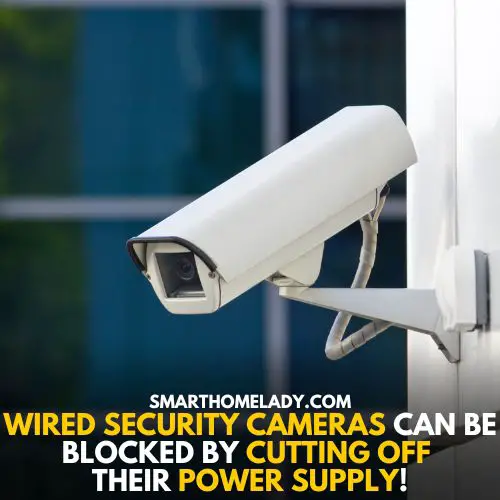
How To Prevent Jamming of Wired Security Cameras?
To prevent these types of attacks on your wired security camera system, you should:
- Ensure that your cables are properly hidden or secured from tampering attempts.
- Additionally, installing surge protectors on all parts of your system can help prevent damage from sudden voltage spikes caused by lightning strikes or power surges.
While wired security cameras may seem more secure than wireless ones at first glance, they still require proper installation and additional precautions to ensure maximum protection against potential threats such as jamming attempts.
Can wiFi security cameras be jammed?
The short answer is yes, wifi security cameras can be jammed. Jamming of Wi-Fi cameras occurs when a signal is disrupted by interference from another source.
In the case of wifi cameras, this usually happens when someone uses a device that emits radio frequency signals on the same channel as the camera’s wireless connection.
Jamming a wifi camera essentially means blocking its communication with the network it connects to, thus rendering it useless. This could potentially leave your property vulnerable to theft or other criminal activities.
How To Prevent Jamming of Wired Security Cameras?
Fortunately, there are ways to prevent such incidents from happening.
- One solution is to use an encrypted network for your camera’s connection instead of an open one. You should also regularly monitor your network for unauthorized devices or suspicious activity.
- In addition, some wifi cameras have anti-jamming features such as advanced encryption protocols and frequency hopping technologies that automatically switch channels if interference is detected.
While it’s possible for wifi security cameras to be jammed, taking proper precautions can significantly reduce this risk and help ensure the optimal performance of your surveillance system.
Suggested Readings
- Can You Use Any DVR With Security Cameras?
- Can Security Cameras See Smoke?
- How Far Can Security Cameras See At Night?
- Can Security Cameras See Inside Cars?
- Why Do Security Cameras Have Green Lights?
Can wireless security cameras be jammed?
Yes, wireless security cameras can be jammed because they are not entirely immune to interference or jamming.
Wireless cameras operate on a specific frequency band, which can be disrupted by other electronic devices that emit signals within the same range. This is known as a denial-of-service attack and can be carried out using simple equipment such as a radio transmitter.
Moreover, some advanced jammers can also interfere with the Wi-Fi network that connects the camera to your router, preventing you from accessing live footage remotely.
It is particularly concerning for those who rely heavily on remote viewing capabilities for surveillance purposes.
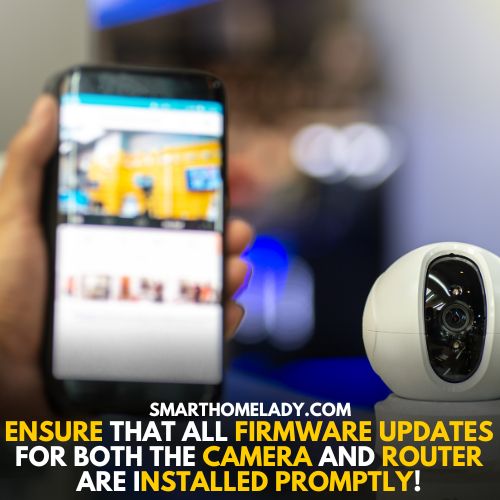
How To Prevent Jamming of Wireless Security Cameras?
To prevent jamming attacks on your wireless security camera system, it’s recommended that:
- You use encryption methods like WPA2 or AES encryption to secure your Wi-Fi network.
- Additionally, ensure that all firmware updates for both the camera and router are installed promptly.
- Avoid placing your cameras close to other electronic devices emitting similar frequencies, such as microwaves or cordless phones.
Can home security cameras be jammed?
Yes, home security cameras can be jammed, leaving your home vulnerable to intruders.
Whether wired or wireless, home security cameras operate on a specific frequency band, this means that if someone knows the exact frequency of your camera, they could use a jamming device to disrupt the signal and prevent it from transmitting video footage.
If you have a wireless home security camera system, it’s important to note that some models may be more susceptible to jamming than others.
For example, older systems that operate on lower frequencies may be easier to interfere with than newer models that use higher frequencies.
It’s also worth noting that while jamming devices exist and can potentially disrupt your home security camera system, they are illegal in many countries, including the United States.
So not only would an intruder need specialized knowledge and equipment to carry out this attack, but doing so would also put them at risk of legal repercussions.
Tip: If you suspect your security system has been tampered with or disrupted, it’s important to contact your security provider immediately for assistance in resolving the issue before anything serious happens.
How To Prevent Jamming of Home Security Cameras?
To protect against potential jamming attacks on your home security camera system, make sure you choose a reputable brand with strong encryption protocols in place.
Additionally, consider installing multiple layers of protection, such as motion sensors or alarm systems, for added peace of mind.
Can ring security cameras be jammed?
The answer is yes; ring security cameras can be jammed. Ring cameras operate on Wi-Fi and Bluetooth connections, which means that they are susceptible to interference from other wireless signals in the area.
How To Prevent Jamming of Ring Security Cameras?
There are ways for homeowners to protect their Ring cameras against jamming attempts, such as;
- Ring security cameras have built-in features like motion detection and cloud storage that allow them to continue recording even if their network connection is interrupted.
- Use a wired internet connection instead of relying solely on Wi-Fi or Bluetooth connectivity.
- Another option would be installing multiple cameras around your property so that if one camera gets jammed or disrupted somehow, others will still record footage of what happened.
While ring security cameras can be jammed like any other wireless device out there – there are measures you can take as a homeowner to minimize this risk and ensure your home remains secure 24/7.
Can CCTV cameras be jammed?
The answer is yes; CCTV cameras can be jammed. However, it’s not easy as these cameras typically use hardwired connections instead of wireless signals.
It means that the signal being transmitted from the camera to the recorder has limited interference and is difficult to disrupt without physically damaging the wiring.
In addition, many CCTV systems have built-in measures such as anti-jamming devices which prevent any attempts at disrupting their signals.

Suggested Readings
- How Far Can Security Cameras See?
- Can We Use CCTV Camera Without DVR?
- Can I Use Xfinity Security Camera Without Service?
- Do Security Cameras Have To Be Visible?
These systems also tend to have backup power supplies, allowing them to continue functioning even during power outages or other disruptions.
Note: Attempting to jam or damage CCTV cameras is illegal and could result in criminal charges. Tampering with these types of security systems poses a threat not only to property but also to people’s safety.
Can eufy security cameras be hacked?
Yes, eufy security cameras, like any other technology, can be vulnerable to hacking attempts.
Hackers often target security cameras to access a home or business’s network or invade privacy.
While Eufy security cameras come with robust encryption protocols and secure connections, they still face potential risks from hackers who use sophisticated techniques such as password cracking and brute-force attacks.
How To Prevent Jamming of Eufy Security Cameras?
To minimize the risk of hacks, it is essential that Eufy camera owners take necessary precautions such as;
- Using strong passwords.
- Regularly updating firmware and software updates.
- Disabling remote access and monitoring the camera feed for suspicious activity if not in use.
- Users should also ensure that their Wi-Fi networks have WPA2 encryption enabled and proper firewall configuration.
By following these measures and being vigilant against possible threats, Eufy security camera owners can significantly reduce the chances of being hacked.
Can blink security cameras be hacked?
Yes, blink security cameras are vulnerable to hacking attempts like any other security camera.
Precautions
- Avoid using public Wi-Fi networks when accessing your Blink app, as these networks are less secure than private ones.
- Consider installing a firewall on your router, which will provide an extra layer of protection against external threats.
While no security measure is foolproof regarding technology devices such as blink security cameras – taking proactive steps towards securing them can go a long way in minimizing vulnerability risks associated with these types of gadgets.
Can criminals jam wifi cameras?
The answer, unfortunately, is yes. WiFi jammers are relatively easy to obtain and use.
However, the consequences of wifi camera jamming can be severe. Criminals could disable your home security system and gain access to your property undetected.
Moreover, once they’ve gained entry into your home or business premises, they might commit various crimes such as theft or vandalism.
How to Detect a camera jammer – 7 Ways
Detection of a jamming attempt is essential for ensuring security camera reliability and protecting against malicious interference. So, here are some ways to detect if a security camera has been jammed.
- Check the video feed from the security cameras. If the video feed is distorted, pixelated, or shows a frozen or blacked-out image, then a jammer will likely be in use.
- Inspect the security camera wiring. If the wiring is tampered with, cut, or damaged, this could indicate a jammer device.
- Look for a suspicious device. If a suspicious device is near the security camera, this could be a jammer.
- Listen for any unusual buzzing or static noise. This could be an indication of a jammer in use.
- Check the signal strength. A jammer may be used if there is a weak signal or the signal strength is inconsistent.
- Examine the area around the security camera for any obstructions. If an object or material is blocking the camera’s line of sight, this could be a sign of a jammer.
- Check the security camera’s settings. If the settings have been changed or tampered with, this could also indicate a jammer.
It is important to be aware of the signs of a security camera jammer and to take appropriate action if a jammer is suspected.
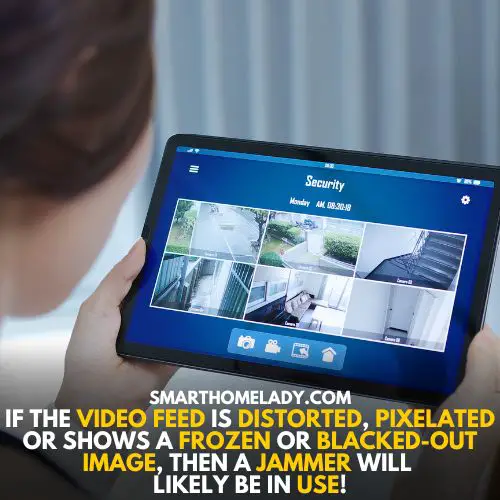
What To Do If You Suspect Your Security Cameras Are Jammed? 4 Steps
If you suspect your security cameras have been jammed, it is important to take immediate action. Here are some steps you can take:
1. Check the power source: Ensure your cameras receive power and the cables are properly connected.
2. Restart your system: Try restarting both your camera and recording device to see if this will resolve any issues.
3. Contact customer support: If you cannot resolve the issue on your own, contact the manufacturer’s customer support for assistance.
4. Consider upgrading or changing systems: If you continue to experience problems with jamming or hacking attempts, it may be time to invest in a more advanced security system.
By being proactive about securing your network and staying vigilant for signs of interference or tampering with your cameras, you can help ensure that your property stays safe and protected at all times.
Security cameras that can’t be jammed – Cameras With These 3 Features
When it comes to security cameras, jamming is a major concern. As such, knowing what type of security camera system would be best for preventing jamming is important.
So, here are some features of security cameras that prevent them from jamming.
1. Multiple Layered Security Cameras
The most effective way to prevent jamming is to invest in a security camera system with multiple layers of protection.
A multi-layered approach, including encryption, authentication, and signal authentication, will ensure that only authorized personnel can access the footage.
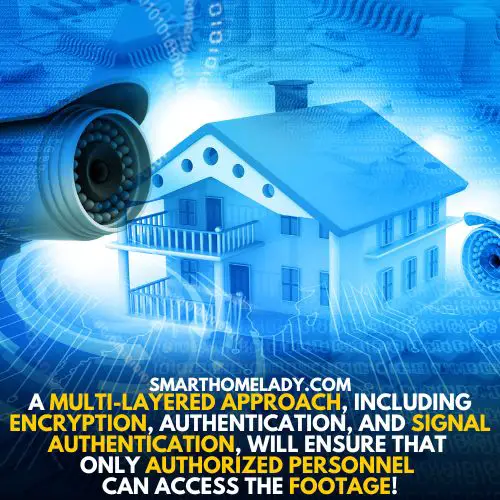
2. Anti-Jamming Device
An anti-jamming device should be installed with the system to detect any attempts at interference.
Furthermore, having a secure wireless connection between the camera and the monitoring station can help reduce the risk of jamming by making it harder for outsiders to intercept or disrupt the signal.
3. High-Quality Cameras
Finally, investing in high-quality cameras and equipment can also help reduce the risk of jamming.
High-quality equipment, such as surge protectors, can help reduce external interference that could cause jams.
Considering all these steps when purchasing a security camera system, one can ensure that their footage is protected from potential disruptions due to jamming activities.
Frequently Asked Questions FAQs
Can People Jam Security Cameras?
Yes, people can jam security cameras. There are a few ways to do this, including using a device that emits a strong signal to disrupt the camera’s footage or using a powerful laser to blind the camera.
However, it’s important to note that jamming a security camera is illegal in many places, so be sure to check your local laws before taking any action.
Can Wired Security Cameras Be Hacked
Yes, wired security cameras can be hacked. However, it is much more difficult to do so than to hack a wireless camera.
Wired cameras are usually connected to a closed-circuit television (CCTV) system, which means that the signal is not broadcasted over the air. This makes it much harder for hackers to intercept the signal and view the footage.
How can you tell if your camera is jammed?
If your camera is jammed, it will be difficult to take pictures or videos. The image may be distorted, and the camera may make a clicking noise when you try to take a picture.
If you are having difficulty taking pictures or videos, it is best to consult a professional to see if your camera is jammed.
Can a security camera be blocked?
The answer is yes. There are various ways to block a security camera, including using physical objects to obstruct the view, specialized camera covers, or even infrared lights.
But it is important to remember blockers or jammers are illegal in many countries, so check your local laws before using one.
Conclusion
The range of signal jamming for security cameras can vary depending on the jammer’s type and strength. While it is possible to jam a security camera, there may be legal repercussions for doing so.
Additionally, security cameras are vulnerable to interference from bad weather or extreme temperatures, which could lead to malfunctions or outages.
To prevent this, it’s important to have a good quality security camera system in place that is resistant to jamming. It’s also wise to check up on your camera system periodically and look for any signs of tampering or disruption.
If you do detect any suspicious activity, it’s important to investigate further and contact local authorities if necessary.


